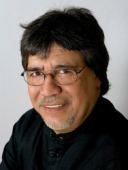Skip to: site menu | section menu | main content
Welcome To Democracy And Socialism .Com
Things should be made as simple as possible, but not any simpler- Albert Einstein
Luis Sepulveda (Oct 1949 - Apr 2020) |
 |
On April 16, the Chilean political activist, writer, journalist, and film director died of Covid-19 in a hospital in the Asturias, Spain.
On February 25, upon returning from a book festival in Portugal, he was admitted to the hospital with signs of fever, and respiratory distress, he died six weeks later, after testing positive for the Novel Coronavirus infection.
Sepulveda was born on October 4, in Ovalle, North of Santiago, Chile. His mother Irma Calfucura was a nurse of Mapuche indigenous people, and his father Jose Sepulveda, was a restaurant owner and a militant of the Chilean Communist Party.
After high school, Sepulveda studied theatre production at the National University of Chile, in Santiago. At the young age of 15 he became politically active in the Communist Youth Organization of Chile, but he left that Organization and joined a fraction of Socialist Party, the Army of National Liberation.
After Socialist Salvador Allende was elected as the President of Chile in 1970, Sepulveda began working in the Department of Cultural Affairs of Chile.
On 11 September of 1973, a bloody military coup sponsored by the US Imperialism brought General Augusto Pinochet to power. During that day President Allende was assassinated at the Moneda Presidential Palace. Thousands of Allende supporters were detained, tortured, killed and disappeared during the Pinochet dictatorship.
Sepulveda was detained, tortured, and was sentence to 36 months in prison. Due to the efforts of the Amnesty International German Branch, he was released conditionally and kept under house arrest. He managed to escape and covertly setup a resistance theatre group. He was arrested again and given a lifetime sentence which reduced later to 28 years of jail. Again, by the intervention of German Amnesty International his sentence commuted to 8 years of exile to Sweden to teach Spanish literature.
In 1977, Sepulveda left Chile, but at the first stop in Buenos Aires, Argentina he escaped from the authorities and after going to Uruguay, Brazil, Paraguay, he finally settled in Quito, Ecuador, as the guest of his writer friend Jorge Enrique Adoum. In Quito he directed the Alliance Francaise Theatre, founded a theatrical company and took part in a UNESCO expedition to assess the impact of colonization on the Shuar (Jivaro) indigenous people. There he worked in close contact with the indigenous organizations and drafted the first accurately teaching plan for the Imbabura Peasants’ Federation in northern Ecuador.
In 1979, Sepulveda joined the Simon Bolivar International Brigade in Nicaragua, which along with Sandinista, was fighting against the US Imperialist’s puppet dictator, Anastasio Somoza. After the victory of Sandinista Revolution, he started working as a journalist, and one year later he left that country to Europe. He had learned German Language during his jail time and because of his admiration of German Theatre, settled in Hamburg, Germany. Then he joined the environmental movement and began working as a Greenpeace journalist. He traveled to many countries in Europe and Africa, while working as a screen writer and film director.
In 1989, Sepulveda returned back to Chile; his first novel, The Old Man Who Read Love Stories, dates back to that year. The Novel was inspired by the writer’s life experience with the Jivaro indigenous people. It was republished many times and each time became a bestseller. In 2001, this Novel made him internationally famous and was adopted into an Australian film, starring Richard Dreyfuss.
Since 1996, Sepulveda lived in Gijon, Asturias region of northern Spain. He married writer and poet Carmen Yanez twice, first in Chile 1971, and then in Gijon in 2004, in between they were twenty years apart without seeing each other. They had six children.
Sepulveda wrote about 20 novels, children books and screen scripts which were translated in many languages. He was the winner of many literary national and international awards.
Some of his most famous works:
Chronicle of Pedro Nobody (1969)
Fear, Life, Death, and other Hallucinations (1986)
Travel Log (1987)
The World at the End of the World (1989)
The Lost Frontier (1994)
The Name of a Bullfighter (1994)
Patagonia Express (1995)
The Story of a Seagull and The Cat Who Taught Her to Fly (1996)
The Story of a Sentimental Killer Followed by Yacare (Alligator) (1998)
Marginal Stories (2000)
Hot Line (2002)
The Madness of Pinochet and Other Articles (2002)
Aladino’s Lamp (2008)
The Shadow of What We Were (2009)
Stories from Here and Elsewhere (2011)
Latest News from the South (2012)
History of Cat and the Mouse who Became Friends (2013)
Ingredient for a life of Great Passion (2013)
History of Snail Which Discovered the Importance of Slowness (2014)
The Mute Uzbek and Other Clandestine Stories (2015)
The End of History (2016)
Filmography:
Live at 17 (Writer and Director) (1986)
Lucky and Zorba (Writer) (1998)
Land of Fire (Screenplay) (2000)
Nowhere (Writer and Director) (2002)
Green Heart (Writer) (2002) [In 2003 received the prize for the best documentary of the Venice Film Festival]